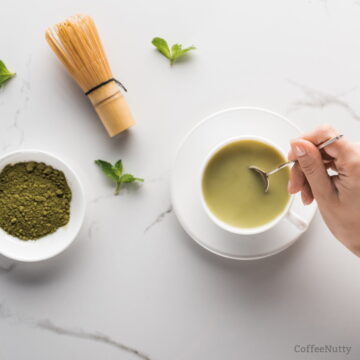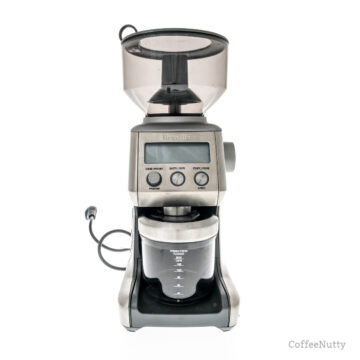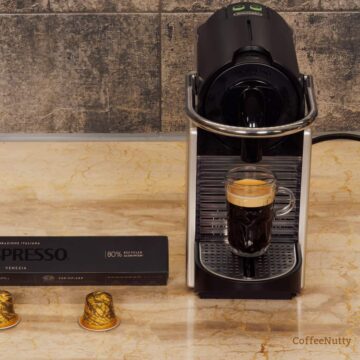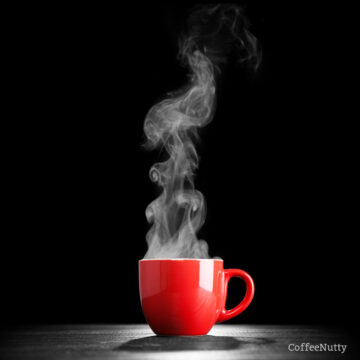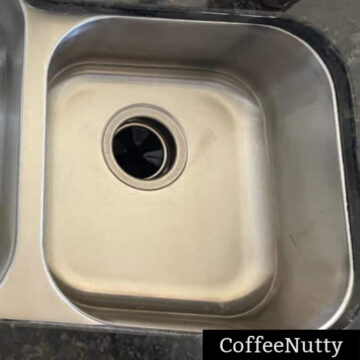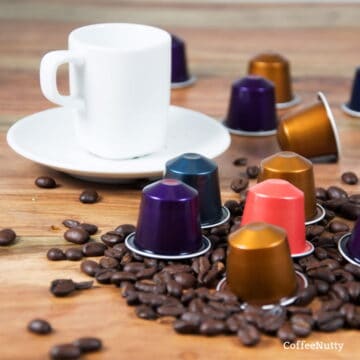Coffee connoisseurs can be picky about the water used for brewing coffee, and rightfully so! You might not realize how the water you use in your coffee machine can affect the final product's taste. But, high-quality ingredients impact coffee flavor.
The best water for coffee brewing is fresh, cold water with high clarity and no odor, and chlorine free. It should also contain the correct TDS and a balance of calcium, sodium, and magnesium—and offer a target pH of 6. As tap waters differ in quality, filtered water is your best option.
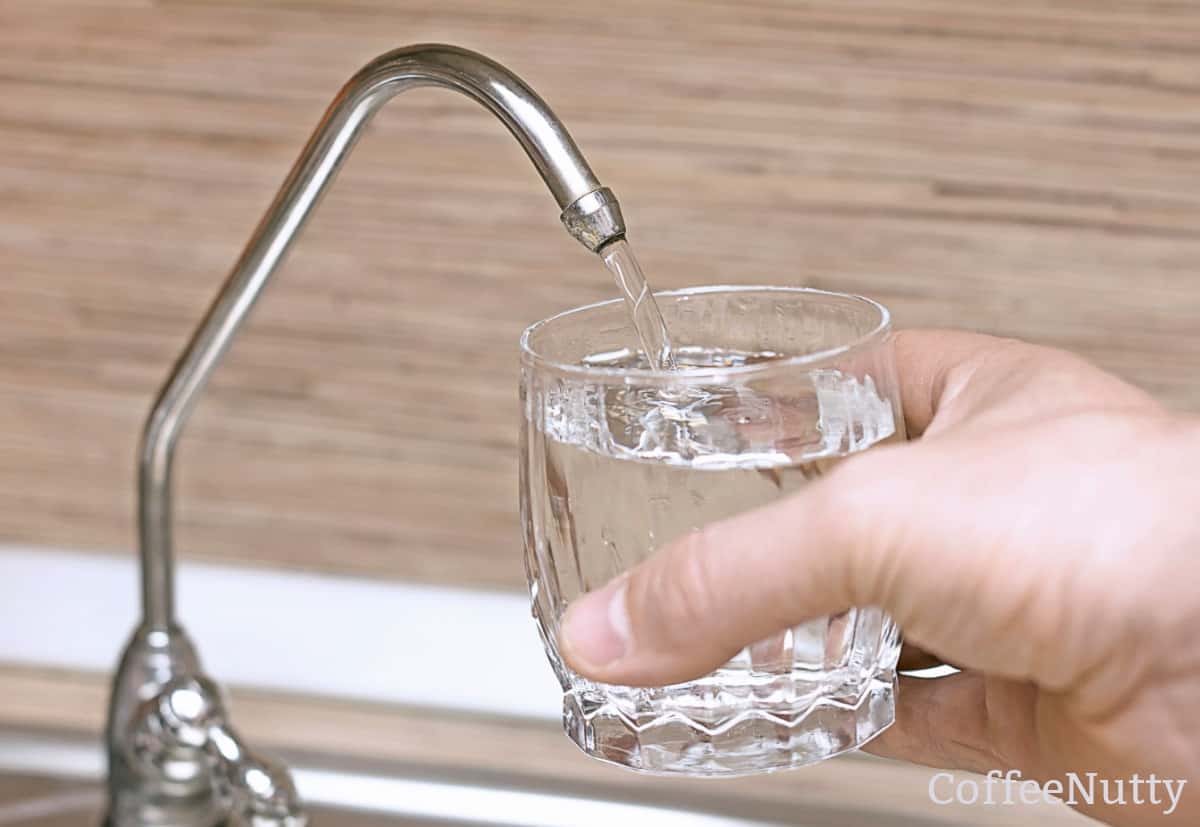
Water is a critical factor in a great cup of coffee.
When you drink coffee, you might think the exceptional flavor has to do with the coffee beans, but it could be the water quality you notice that is affecting. the taste of your coffee.
Keep reading to see how and why water affects the coffee taste by increasing the rich flavor.
Jump to:
Why Filtered Water Is Best for Brewing Coffee
Many experts recommend cold, clean water as the ideal brew mix.
Still, as tap waters vary too widely from area to area—it is not always possible to follow their recommendations. Unless you live in an area where tap water meets the required parameters, filtered water is usually the safer bet.
When you brew a coffee, the ideal water should be a middle ground between soft and hard water.
Soft water won’t enhance the flavor of your coffee and can leave the coffee with a bland taste. Most coffee experts say filtered water is the best for brewing coffee.
Unless you choose filtered water, tap water has some added elements that will affect the coffee taste.
Many municipalities add the following to allow the water to travel the distance from the processing plant to your home.
- Chlorine cleans and treats the water supply and can make the water taste vaguely like chemicals.
- Fluoride is also a common additive to help protect teeth since not everyone has the opportunity to go to the dentist.
- Along the way, water will pick up dirt particles because it runs through a processing plant and pipes.
- Some municipal water contains heavy metals like mercury that also should be filtered out.
Parameters of the Best Filtered Coffee Water
The best water filters target removing anything in the water that can leave an unpleasant taste.
Chlorine can give tap water a distinct flavor that should not be part of your coffee experience.
One way to learn what is in your tap water is to purchase a water quality testing kit. This reliable kit will tell you if your drinking water is healthy so you can decide the best water filter to use for improved water quality.
We like the Water Quality Tester, Accurate TDS Meter found on Amazon because it has a digital readout that locks in the measurements for you to keep and refer to easily.
This Youtube video explains how to use pH and TDS meters to evaluate the water you use for brewing coffee. https://www.youtube.com/watch?v=CF-eBB0fBZQ
How Minerals in Water Affect the Flavor in Coffees
While water tastes like water, there are three minerals you can’t taste but are present.
Bicarbonate, calcium, and magnesium are added to public water to ensure good health. Each of these minerals affects the taste of the coffee, whether by extracting different flavors from the coffee beans or acting on other taste receptors.
- Bicarbonate is a salt that influences water softness. Studies show that bicarbonate can produce a bitter flavor in coffee.
- The presence of calcium in water is also tasteless, but the calcium will influence the coffee taste. Calcium is necessary for strong bones, making it a logical addition to tap water.
- Magnesium is also present in tap water and, combined with calcium, makes water hard. Many say great coffee must come from excellent beans and hard water since water hardness produces a rich taste combined with the beans.
How TDS in Water Affects the Flavor in Coffee
Total dissolved solids refer to all the organic and inorganic and organic matter that your water contains.
TDS is important in your coffee water because if the levels are too low, it can increase your coffee extraction to create a bitter brew. If the levels are too high—it won't extract the coffee properly and deliver inferior flavor.
The Specialty Coffee Association (SCA) recommends that brewers aim for a TDS count of 11.5 to 13.5g/L or as close to this figure as possible, with no traces of chlorine.
How Water pH Affects Coffee Taste
pH refers to alkalinity and acidity in water. Most tap water falls at the low end of alkalinity, while most coffee falls at the higher end of acidity. The flavors you taste in coffee are directly related to acidity levels.
Acids have a pH above seven, while any number below is alkaline.
After the roasting process, several acids will affect the flavor still present in the coffee beans.
- Citric acids are often present in arabica coffee beans, imparting a citrus taste to brewed coffee.
- Phosphoric acid has a sweet citrus taste like mangoes.
- Chlorogenic acids are what you taste when you say coffee is bitter.
- Malic acid is another fruity-tasting acid that imparts a pear or apple flavor.
- Acetic acid delivers a sharp, vinegary-taste
- Quinic acid is sour and likely what you taste in coffee left in the pot for too long.
- Tartaric acid can make the coffee have a tart grape or wine flavor.
Using water with a low pH can balance the acidity in coffee grounds, giving you excellent coffee flavor. In addition, cold brew and french press coffee often have the least acidic taste.
For the best coffee water, you should aim for a pH of 7, but 6.5-7.5ph is acceptable according to the SCA.
Best Filters for Coffee Water
Even if coffee lovers have the best coffee makers in the world, your coffee won't be perfect unless you have the right beans and water.
Combining the best coffee water with high-quality coffee beans can deliver a perfect brew every time.
Like coffee flavors, most coffee drinkers prefer one water filter over another. Several water filters will give you the water composition for espresso, drip coffee, and cold brew.

Brondell Reverse Osmosis Water Filter
The Brondell RO Circle Water Saving Reverse Osmosis Water Filter System uses no electricity to fill the tank with filtered water.
It offers an under-sink mounting method that saves space and has an attached faucet to supply your coffee reservoir.
Since RO water is immaculate, you might need to add some minerals to enhance the coffee taste.
Brita Stream UltraMax Water Filter Dispenser
People love Brita filters for good reasons!
They are convenient, can fit in tight spaces, and consistently deliver great-tasting water.
Consider using the Brita Stream UltraMax Water Filter Dispenser that holds up to twenty-five cups of water, ensuring you have filtered water whenever you are in the mood for coffee.
Third Wave Water
By now, you know that all water contains some total dissolved solids (TDS), some you want to keep and others you want to eliminate.
Third Wave Water can take all the guesswork of creating the perfect water. All you do is add a packet to a gallon (3.7L) of distilled water and shake. The water is the ideal sodium, calcium, and magnesium ratio to give your coffee an elevated flavor.
Various Water Options for Brewing Coffee
While the main water for coffee is tap water, some tap waters contain unwanted additives which affect the final coffee flavor.
If you experiment with different water for brewing, you will find one you like best, and you can stick with it.
Tap Water for Brewing Coffee
Tap water from the spigot comes from a well or the municipality.
Some coffee drinkers agree that this water is the cleanest, most natural water for fresh coffee. Well-sourced water has no additives or chemicals to change the water chemistry, so as long as your well water travels through a filter to remove sediment, it is a good choice.
Tap water from the municipal source often has chlorine to kill bacteria and dissolved minerals to reduce the likelihood of mineral deficiencies.
Your body needs minerals for good health, and one way to ensure this is for the municipal water source to them to the water you drink from the tap.
Reverse Osmosis Water for Brewing Coffee
Reverse osmosis is a water filtration method that removes contaminants from the water. Some coffee drinkers say coffee made with reverse osmosis water has considerably less flavor—much like a meat dish without seasoning.
If you prefer using reverse osmosis filtered water, you can purchase mineral packets to add to the brewing water.
This addition will improve the coffee flavor.
Distilled Water for Brewing Coffee
Distilled water has been “steam cleaned” to remove water contaminants.
Distilled water is soft water with no calcium or magnesium to enhance the taste of brewed coffee. Distilled water is pure and delivers a stale, bitter coffee taste that won’t leave mineral deposits in your coffee maker.
Bottled Water for Brewing Coffee
When you choose bottled water for the coffee brewing process, remember that bottled water will vary in pH levels and mineral content.
Recall that the number of minerals influences the water's hardness and gives the coffee's total dissolved solids an attachment point.
The best bottled water for coffee brewing is one with a high magnesium content. This mineral is the one that coffee solids stick to the best, resulting in a superior-tasting, good cup of coffee.
Activated Carbon Filtered Water for Brewing Coffee
The job of an activated carbon filter is to remove any sour flavors from your water.
As the tap water flows through the carbon filter, the filter’s porous surface catches any minerals or additives like chlorine. An activated carbon filter goes one step further to remove the smallest particles in the water.
The activated carbon filter produces the most purified water; however, it also removes the magnesium, allowing the coffee particles to adhere and improve the coffee taste.
Because this filtering process removes the most minute particles from the water, it might leave your coffee tasting flat.
Conclusion
Since coffee has a higher percentage of water than any other component, it stands to reason that water quality would directly impact the coffee taste.
The coffee beans and brewing method also influence the coffee taste and richness.
While science says to choose water with a high magnesium concentration where the coffee solids can attach, the most pleasing coffee taste is a matter of personal preference.
So, find the kind of water, coffee bean, and brewing method that pleases your palette.
Pin this to your favorite Pinterest board and save it for later!


